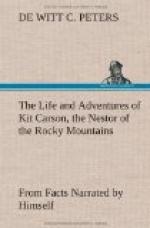The spies were not long in discovering a trail made by the Indians, to which they led the main portion of the command. This trail had been so frequently used of late by the Indians in driving stolen bands of sheep and cattle over it, that it was now a well-trodden road and therefore there was no difficulty in keeping on it at all hours of the day and night.
Being accustomed to perform his duty carefully, and, at the same time, to use dispatch, the Colonel, in the course of a few days, led his party to the entrance of the Saquachi Pass, which is the great natural opening in the mountains that bound, on the west, the valley of San Luis. As they approached the mouth of the pass, the men were traveling close under the hills, therefore, on coming to it, and in order to follow it up, it was necessary to turn off almost at a right angle. The spies, as was usual when the command was on the march, were considerably in the advance. They had hardly entered the pass and had just reached the summit of a knoll which lay in their path, and which had hitherto prevented their seeing up the valley, when, all at once, the long looked for Indians were presented to their view. They were but a short distance off, and as if surprised at thus so suddenly discovering each other, both parties halted. During this state of suspense, the white men noticed that the Indians were arrayed in their war costume, showing that they were bound on another plundering expedition. Everything went to show that the visit which the white men were making to their mountain haunts was unexpected by the red men.
The Indians quickly recovered from their astonishment and began to form in line of battle by spreading themselves out across the valley. They were evidently emboldened by the small force with which, apparently, they had to contend, and felt certain that a victory would be both easy and sure. Having taken their position, Blanco, their chief, was easily recognized by the red woolen shirt which he wore. He was busy, riding along in front of his warriors, occasionally stopping to give some command. As they were near enough so to do, the Indians opened a warfare of small talk, in the Spanish language. They charged their adversaries with being afraid to advance, or to use their expressive words, the Americans were as cowardly as squaws. To these taunts no reply was made; but to keep up the decoy, the few soldiers who were exposed to view, remained stationary, while word was passed to the rear of what was transpiring in the advance. Thus several minutes passed by; but they were not thrown away. During this time, most of the dragoons and volunteers were relieving themselves of such extra luggage as overcoats, blankets, etc.; saddle girths were tightened and weapons put in order for immediate use. The Indians were finely mounted, and about two hundred and fifty strong; and, as their wild career had gone so long unchecked, their bravery was aroused to its highest pitch.




